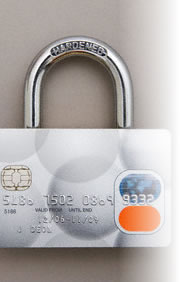Your Credit Card Number: When Should You Refuse to Give It?

Crooks have devised a variety of scams to weasel your credit card number away from you so they can use it to charge a bunch of stuff in your name.
Guard that number carefully and don’t reveal it in these four instances:
• A telemarketer calls.
Don’t ever give your credit card number over the phone, even if the person says he’s from your credit card company. Give your credit card number only when you make the call and know you’re phoning a legitimate enterprise.
• An email asks for your credit card number.
Phishing scams manage to net thousands of unsuspecting people a year. These emails purport to be from credit card companies or banks and ask you to click on links to Web sites, where you’re prompted to enter personal financial information. Don’t click on the link, even if the logo on the e-mail looks legit. Call your credit card company directly using the number on the back of the card if you think the issuer needs information from you.
• An “urgent” text message demands your credit card verification.
Smishing is similar to phishing but the scams are delivered via text messages on cell phones. The “sm” in smishing stands for short message service. Sometimes the messages direct you to call an 800 number to reactivate your account or to visit a Web site. Don’t do either, no matter how urgent the message sounds. Call your credit card company directly if you’re concerned.
• A Web site does not appear secure.
Avoid credit card use with obscure online retailers that don’t provide information on security and privacy policies. A closed padlock, an unbroken key symbol, or the “s” in the url — https:// indicate security, as well as membership in Internet security programs, such as TRUSTe, Verisign, or BBBonline. Also make sure the company provides a physical address and phone number.
Remember, you can be a victim of fraud even if your physical credit cards aren’t stolen. Keep those credit card numbers a secret between you, your credit card companies, and trusted merchants.
Disclaimer:The information in this article is believed to be accurate as of the date it was written. Please keep in mind that credit card offers change frequently. Therefore, we cannot guarantee the accuracy of the information in this article. Reasonable efforts are made to maintain accurate information. See the online credit card application for full terms and conditions on offers and rewards. Please verify all terms and conditions of any credit card prior to applying.
This content is not provided by any company mentioned in this article. Any opinions, analyses, reviews or recommendations expressed here are those of the author’s alone, and have not been reviewed, approved or otherwise endorsed by any such company. CardRatings.com does not review every company or every offer available on the market.
Published